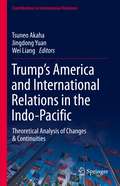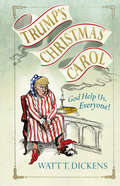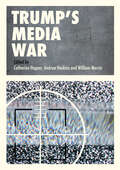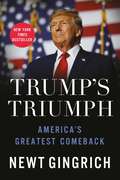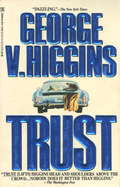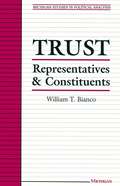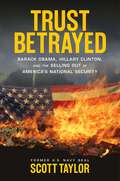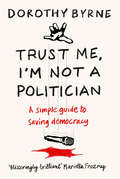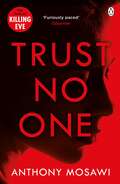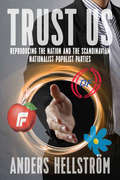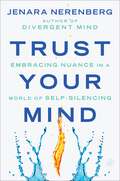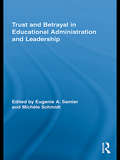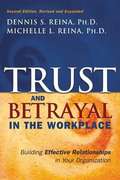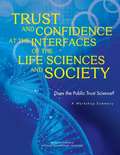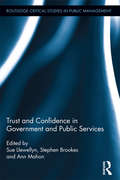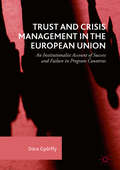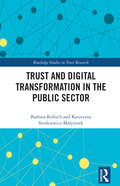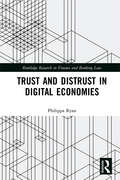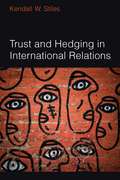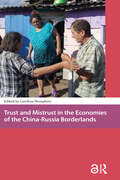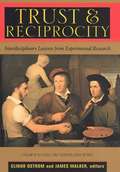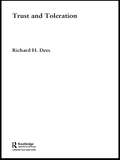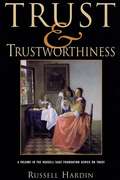- Table View
- List View
Trump’s America and International Relations in the Indo-Pacific: Theoretical Analysis of Changes & Continuities (Contributions to International Relations)
by Tsuneo Akaha Wei Liang Jingdong YuanThe book assesses U.S. foreign relations in the Indo-Pacific during the Trump Administration, with a particular focus on the regional powers’ response to Trump's “America First” policy. The chapter authors draw on the theoretical insights from dominant International Relations theories – (Neo)Realism, Liberal Institutionalism, and Constructivism – to explain both continuities and discontinuities found in the regional powers’ security and foreign economic policies before and during the Trump Administration. The book will be of interest to new and advanced students of International Relations, Asian Studies, and U.S. foreign policy. The multi-national perspectives of the regional experts offer penetrating analyses of the likely legacy (or lack thereof) of the range of political, security, and trade policy initiatives launched by the Trump Administration and its implications for the balance of power, regional institutions, and national identity-informed approaches to international relations in the Indo-Pacific.
Trump’s Christmas Carol
by Lucien Young Watt T. Dickens‘I have the best ghosts, everyone says so’President Ebenezer Trump is a rich old fool, whose heart is as small as his hands and whose words are as false as his hair. On Christmas Eve, he is visited by three spirits, all intent on changing his evil ways: Bill Clinton, the jovial Ghost of Christmas Past; Barack Obama, the big-eared Ghost of Christmas Present; and the terrifying Ghost of Christmas Yet to Come, who shows him how abolishing Obamacare will finish off Tiny Tim…'This Scrooge is gonna be yooooge...'
Trump’s Media War
by Andrew Hoskins William Merrin Catherine HapperThe election of Donald Trump as US President in 2016 seemed to catch the world napping. Like the vote for Brexit in the UK, there seemed to be a new de-synchronicity – a huge reality gap – between the unfolding of history and the mainstream news media’s interpretations of and reporting of contemporary events. Through a series of short, sharp interventions from academics and journalists, this book interrogates the emergent media war around Donald Trump. A series of interconnected themes are used to set an agenda for exploration of Trump as the lynch-pin in the fall of the liberal mainstream and the rise of the right media mainstream in the USA. By exploring topics such as Trump’s television celebrity, his presidential candidacy and data-driven election campaign, his use of social media, his press conferences and combative relationship with the mainstream media, and the question of ‘fake news’ and his administration’s defence of ‘alternative facts’, the contributors rally together to map the parallels of the seemingly momentous and continuing shifts in the wider relationship between media and politics.
Trump’s Triumph: America's Greatest Comeback
by Newt Gingrich#1 New York Times bestselling author Newt Gingrich takes readers inside the most significant political comeback in American history and explains where the Trump movement goes from here in this "very, very important book" (Mark Levin). <P> Despite a nine-year effort to destroy him, President Donald J. Trump succeeded in a historic comeback victory in the 2024 presidential election. This was Trump’s Triumph. Winning the popular and electoral votes, President Trump became the first president to be nonconsecutively re-elected since President Grover Cleveland. This all happened because President Trump was never a typical political candidate. He is the leader of a movement, which he recognized in the American people. To be clear: President Trump did not invent the Make America Great Again movement, he intuited it. Meanwhile, elites in media, academia, government, and politics learned a big lesson: Americans no longer trust them. President Trump assembled a massive coalition of Americans from all backgrounds who were tired of being told what to do, say, and believe. He made historic in-roads with voter groups which have not traditionally voted for Republicans. President Trump survived court cases, impeachments, outright lies – and two assassination attempts. All the while, the elites described a future which every day Americans did not want. The Joe Biden-Kamala Harris (and later Harris-Tim Walz) tickets represented three failures through which the American people were actively suffering: high inflation, a full-blown immigration crisis, and a prevailing elite ideology which they found at best confusing and at worst insane. Trump’s Triumph puts all this into context, explains how President Trump overcame it all, and describes the future of the Make America Great Again movement. <b>New York Times Bestseller</b>
Trust
by George V. HigginsThe characters truly speak for themselves in George V. Higgins' chilling tour de force about deceit, blackmail and the importance of paying one's dues. Ultimate recidivist Earl Beale has learnt little from his early release from jail and narrow escape from being drafted, seemingly nothing can cure him of his criminal ways. Obsessed by money, and with a keen eye for scheming, he's the kind of car salesman no one can trust. When suddenly some unfinished business from his past catches up with him, it's dubitable whether he's going to successfully extricate himself from this one. A witty yet stinging tale of the dangers of putting money and self-interest above everything else, Trust is about a man with no scruples.
Trust Betrayed: Barack Obama, Hillary Clinton, and the Selling Out of America's National Security
by Scott TaylorLoose Lips Sink Ships Every American knows the old World War II saying-but ex-Navy SEAL sniper Scott Taylor believes today's leaders have forgotten it. After serving his country for eight years and watching brave comrades die, Taylor came home to a White House that leaks sensitive intelligence information whenever politically expedient. Now, on behalf of all the men and women in uniform whose lives are in jeopardy, Taylor is speaking out.
Trust But Verify
by Karna Small Bodman"Bodman's hard-won information and sheer storytelling talent make this a book to remember.” —LEE CHILD, #1 worldwide bestselling author of the Jack Reacher series "Karna Bodman’s Trust But Verify is a riveting page-turner you won’t want to put down!" - CARLA NEGGERS, bestselling author of Imposter's Lure Samantha Reid, the brilliant Director of the White House Office of Homeland Security, is enjoying a rare evening away from Washington at a Florida charity ball when a bomb sends the well-heeled attendees stampeding into the night. Narrowly escaping the blast, Reid returns to the White House, where she has been trailing the massacres and illicit arms sales of a shadowy group of Russian oligarchs... all of whom want her dead. Caught in an ever-tightening spiral of lies and ruthless hitmen, Reid must race the clock against her assassins. But she's not alone. When FBI special agent Brett Keating discovers Samantha was the target of the Florida bomb, he resolves to protect her, while also unravelling a brazen plot that threatens the lives of international financial leaders and stock markets worldwide.
Trust Me, I'm Not A Politician: A simple guide to saving democracy
by Dorothy ByrneIn an age where more British people believe in aliens than trust our politicians, Dorothy Byrne asks the question: what went wrong and how can our trust in democracy and public life be regained? In this scintillating essay, nothing and no one escapes Byrne's razor-sharp wit as she takes on the politicians avoiding rigorous journalistic scrutiny, explores the pitfalls of impartiality, imagines what Plato might say to Trump – and calls out plenty of sexist bastards along the way. This is a ferocious, frank, and often wildly funny attempt to separate the truth from the lies at a time of national crisis.
Trust Me, I'm Not A Politician: A simple guide to saving democracy
by Dorothy ByrneIn an age where more British people believe in aliens than trust our politicians, Dorothy Byrne asks the question: what went wrong and how can our trust in democracy and public life be regained? In this scintillating essay, nothing and no one escapes Byrne's razor-sharp wit as she takes on the politicians avoiding rigorous journalistic scrutiny, explores the pitfalls of impartiality, imagines what Plato might say to Trump – and calls out plenty of sexist bastards along the way. This is a ferocious, frank, and often wildly funny attempt to separate the truth from the lies at a time of national crisis.
Trust No One: I Am Pilgrim meets Orphan X in this explosive thriller. You won't be able to put it down
by Anthony Mosawi__________My name is Sara Eden, and this is all I can remember . . . There are government agents pursuing me. They think I know something they want. They will never stop. I could be a danger. I could be a weapon. I could be a victim. The only thing I know for certain is, I must . . . TRUST NO ONE.Fans of Killing Eve, I Am Pilgrim and Orphan X won't be able to put down this high-concept read that grips and entertains like a Hollywood thriller.'Will have you guessing till the very last page. Explosively exciting, an instant spy classic' Tom Marcus, former MI5 agent and bestselling author of Soldier Spy 'Furiously paced' Observer
Trust Us: Reproducing the Nation and the Scandinavian Nationalist Populist Parties
by Anders HellströmIn Scandinavia, there is separation in the electorate between those who embrace diversity and those who wish for tighter bonds between people and nation. <P><P>This book focuses on three nationalist populist parties in Scandinavia-the Sweden Democrats, the Progress Party in Norway, and the Danish People's Party. In order to affect domestic politics by addressing this conflict of diversity versus homogeneity, these parties must enter the national parliament while earning the nation's trust. Of the three, the Sweden Democrats have yet to earn the trust of the mainstream, leading to polarized and emotionally driven public debate that raises the question of national identity and what is understood as the common man.
Trust Your Mind: Embracing Nuance in a World of Self-Silencing
by Jenara NerenbergAn urgent examination of self-silencing culture and the toxic impact of groupthink, by the author of Divergent Mind and founder of The Neurodiversity Project. Nerenberg empowers readers with tools to understand the mind and navigate an increasingly polarized world, from campuses and workplaces, to the media and beyond.Connected across geography and culture via the internet, the world is both a vast, limitless landscape and an ever-shrinking echo chamber. Communication, especially discourse over free speech, is becoming increasingly divisive; one person’s right to speak comes into conflict with another seeking to prevent harm. Our tolerance for differing opinions is also narrowing. A “wrong” remark or comment, no matter how seemingly innocent, can result in banishment, and contradictory ideas spark hysteria and backlash—what is referred to as “cancel culture.” This polarization affects everyone of us—among friends and families, workplaces and communities—and threatens the fabric of society.In this timely book, Jenara Nerenberg analyzes this phenomenon of “self-silencing,” asking potent questions about how harmful groupthink has become accepted. Applying her expertise in journalism, psychology, and public health, she digs deep into urgent problems that are worsening under a culture of self-censorship, including loneliness, isolation, and polarization.But there is hope. Nerenberg offers insights for how to identify and escape groupthink and transform fear into empathy, allowing space for authentic communication that reduces—rather than causes—harm to others.
Trust and Betrayal in Educational Administration and Leadership (Routledge Research in Education)
by Eugenie A. SamierThis collection explores critical and foundational theory for trust in educational administration and leadership as it influences a broad range of topics, such as ethics, governance, diversity, policy, management, and power. It demonstrates the relevance of this foundation to practical issues and problems internationally, both within the organizational context and extra-organizationally. Contributors from throughout the world focus on the application of trust factors as they affect our understanding of, and practice in, educational organizations. This volume will be of interest to students and faculty of educational administration theory, the policy and politics of education, and educational leadership as well as practitioners and policy makers.
Trust and Betrayal in the Workplace: Building Effective Relationships in Your Organization (2nd edition)
by Dennis S. Reina Michelle L. ReinaThis book describes the ways that trust in the workplace can enhance worker productivity and increase employees' willingness to take risks, share information, and learn from mistakes. It argues that without trust, contemporary organizations will be unable to take the risks necessary to succeed in the rapidly changing environments of the new global economy. The Reinas both hold PhDs in human and organizational development and work for an organization development research and consulting firm. Annotation c. Book News, Inc., Portland, OR (booknews.com)
Trust and Confidence at the Interfaces of the Life Sciences and Society: Does the Public Trust Science? A Workshop Summary
by Helaine E. ResnickDoes the public trust science? Scientists? Scientific organizations? What roles do trust and the lack of trust play in public debates about how science can be used to address such societal concerns as childhood vaccination, cancer screening, and a warming planet? What could happen if social trust in science or scientists faded? These types of questions led the Roundtable on Public Interfaces of the Life Sciences of the National Academies of Sciences, Engineering, and Medicine to convene a 2-day workshop on May 5-6, 2015 on public trust in science. This report explores empirical evidence on public opinion and attitudes toward life sciences as they relate to societal issues, whether and how contentious debate about select life science topics mediates trust, and the roles that scientists, business, media, community groups, and other stakeholders play in creating and maintaining public confidence in life sciences. Does the Public Trust Science? Trust and Confidence at the Interfaces of the Life Sciences and Society highlights research on the elements of trust and how to build, mend, or maintain trust; and examine best practices in the context of scientist engagement with lay audiences around social issues.
Trust and Confidence in Government and Public Services (Routledge Critical Studies in Public Management #12)
by Stephen Brookes Sue Llewellyn Ann MahonTrust and confidence are topical issues. Pundits claim that citizens trust governments and public services increasingly less - identifying a powerful new erosion of confidence that, in the US, goes back at least to Watergate in the 1970s. Recently, media exposure in the UK about MP expenses has been extensive, and a court case ruled in favor of publishing expense claims and against exempting MPs from the scrutiny which all citizens are subject to under ‘freedom of information.’ As a result, revelations about everything from property speculation to bespoke duck pond houses have fueled public outcry, and survey evidence shows that citizens increasingly distrust the government with public resources. This book gathers together arguments and evidence to answers questions such as: What is trust? Can trust be boosted through regulation? What role does leadership play in rebuilding trust? How does trust and confidence affect public services? The chapters in this collection explore these questions across several countries and different sectors of public service provision: health, education, social services, the police, and the third sector. The contributions offer empirical evidence about how the issues of trust and confidence differ across countries and sectors, and develop ideas about how trust and confidence in government and public services may adjust in the information age.
Trust and Crisis Management in the European Union: An Institutionalist Account of Success and Failure in Program Countries
by Dóra GyőrffyThis book addresses and explains the divergent economic and political outcomes of the financialcrisis in the eight European Union member states which needed a bailout program: Cyprus,Greece, Hungary, Ireland, Latvia, Portugal, Romania and Spain. Looking at crisis management asa series of relationships where cooperation is essential, this book focuses on the essential role oftrust during the process. It argues that the presence or absence of trust during the negotiationand implementation of the bailout program leads to self-reinforcing cycles of success andfailure. The analysis of these eight countries also explores the institutional sources of trust – itshows that a commitment to limited government is associated with both economic success andresistance to populism. The final chapter considers the implications for the future of the EU andcalls attention to the importance of strengthening domestic institutions in order to bridge thegap between concerns over moral hazard and expectations of solidarity.
Trust and Digital Transformation in the Public Sector (Routledge Studies in Trust Research)
by Barbara Kożuch Katarzyna Sienkiewicz-MałyjurekDigital transformation is a promising way to increase the possibilities and effectiveness of public organizations, but the implementation of digital technologies alone does not bring value. It is vital to convince and motivate people to use new ways of public services delivery and it is necessary to trust both public institutions and new technologies. Digital trust is considered a key determinant of acceptance of digital technologies, leading to their effective use and creation of innovative solutions. However, little is known about creating and using trust as a driving force of digital transformation. In this approach, trust is not only a motivating factor to use digital technologies but also a trigger for changes in the action strategy. In this book, trust is analyzed from this perspective. The authors present the importance of digital trust, as well as its evolving nature manifested along with the progress of digital transformation. Offering both theoretical and practical insights, this volume will add value to trust theory and digital governance theory by indicating the importance of organizational trust and the ways of its use in the development of public service delivery processes and performance based on digital transformation. It will be of interest to researchers, academics, professionals, and advanced students in the fields of public management, innovation, ethics, and organizational studies.
Trust and Distrust in Digital Economies (Routledge Research in Finance and Banking Law)
by Philippa RyanIn digital economies, the Internet enables the "platformisation" of everything. Big technology companies and mobile apps are running mega marketplaces, supported by seamless online payments systems. This rapidly expanding ecosystem is fueled by data. Meanwhile, perceptions of the global financial crisis, data breaches, disinformation and the manipulation of political sentiment have combined to create a modern trust crisis. A lack of trust constrains commerce, particularly in terms of consumer protection and investment. Big data, artificial intelligence, automated algorithms and blockchain technology offer new solutions and risks. Trust in our legal systems depends on certainty, consistency and enforceability of the law. However, regulatory and remedial gaps exist because the law has not kept up with technology. This work explores the role of competency and good faith, in the creation of social and legal relationships of trust; and the need for governance transparency and human accountability to combat distrust, particularly in digital economies.
Trust and Hedging in International Relations
by Kendall StilesDo states trust each other? What are the political and ethical implications of trust? Drawing from a wide range of disciplines, Trust and Hedging in International Relations adds to the emerging literature on trust in international relations by offering a systematic measure of state-to-state trust. Looking at how relationships between European microstates and their partners have evolved over the past few centuries, Stiles finds that rather than trusting, most microstates are careful to hedge in their relations by agreeing only to arrangements that provide them with opt-out clauses, heavy involvement in joint decision-making, and sunset provisions. In the process, Stiles assesses the role of rationality, social relations, identity politics, and other theories of trust to demonstrate that trust is neither essential for cooperation nor a guarantee of protection and safety. Finally, he explores the ethical implications of a foreign policy founded on trust—in particular whether heads of state have the right to enter into open-ended agreements that put their citizens at risk.
Trust and Mistrust in the Economies of the China-Russia Borderlands (Asian Borderlands)
by Caroline HumphreyThe first English-language book to focus on northeast Sino-Russian border economies, Trust and Mistrust in the Economies of the China-Russia Borderlands examines how trans-border economies function in practice. The authors offer an anthropological understanding of trust in juxtaposition to the economy and the state. They argue that the history of suspicion and the securitised character of the Sino-Russian border mean that trust is at a premium. The chapters show how diverse kinds of cross-border business manage to operate, often across great distances, despite widespread mistrust.
Trust and Reciprocity: Interdisciplinary Lessons for Experimental Research
by James Walker Elinor OstromTrust is essential to economic and social transactions of all kinds, from choosing a marriage partner, to taking a job, and even buying a used car. The benefits to be gained from such transactions originate in the willingness of individuals to take risks by placing trust in others to behave in cooperative and non-exploitative ways. But how do humans decide whether or not to trust someone? Using findings from evolutionary psychology, game theory, and laboratory experiments, Trust and Reciprocity examines the importance of reciprocal relationships in explaining the origins of trust and trustworthy behavior. In Part I, contributor Russell Hardin argues that before one can understand trust one must account for the conditions that make someone trustworthy. Elinor Ostrom discusses evidence that individuals achieve outcomes better than those predicted by models of game theory based on purely selfish motivations. In Part II, the book takes on the biological foundations of trust. Frans de Waal illustrates the deep evolutionary roots of trust and reciprocity with examples from the animal world, such as the way chimpanzees exchange social services like grooming and sharing. Other contributors look at the links between evolution, cognition, and behavior. Kevin McCabe examines how the human mind processes the complex commitments that reciprocal relationships require, summarizing brain imaging experiments that suggest the frontal lobe region is activated when humans try to cooperate with their fellow humans. Acknowledging the importance of game theory as a theoretical model for examining strategic relationships, in Part III the contributors tackle the question of how simple game theoretic models must be extended to explain behavior in situations involving trust and reciprocity. Reviewing a range of experimental studies, Karen Cook and Robin Cooper conclude that trust is dependent on the complex relationships between incentives and individual characteristics, and must be examined in light of the social contexts which promote or erode trust. As an example, Catherine Eckel and Rick Wilson explore how people's cues, such as facial expressions and body language, affect whether others will trust them. The divergent views in this volume are unified by the basic conviction that humans gain through the development of trusting relationships. Trust and Reciprocity advances our understanding of what makes people willing or unwilling to take the risks involved in building such relationships and why. A Volume in the Russell Sage Foundation Series on Trust
Trust and Toleration (Routledge Studies in Twentieth-Century Philosophy)
by Richard H. DeesToleration would seem to be the most rational response to deep conflicts. However, by examining the conditions under which trust can develop between warring parties, it becomes clear that a fundamental shift in values - a conversion - is required before toleration makes sense. This book argues that maintaining trust is the key to stable practices of toleration.
Trust and Trustworthiness
by Russell HardinWhat does it mean to "trust?" What makes us feel secure enough to place our confidence—even at times our welfare—in the hands of other people? Is it possible to "trust" an institution? What exactly do people mean when they claim to "distrust" their governments? As difficult as it may be to define, trust is essential to the formation and maintenance of a civil society. In Trust and Trustworthiness political scientist Russell Hardin addresses the standard theories of trust and articulates his own new and compelling idea: that much of what we call trust can be best described as "encapsulated interest." Research into the roles of trust in our society has offered a broad range of often conflicting theories. Some theorists maintain that trust is a social virtue that cannot be reduced to strategic self-interest; others claim that trusting another person is ultimately a rational calculation based on information about that person and his or her incentives and motivations. Hardin argues that we place our trust in persons whom we believe to have strong reasons to act in our best interests. He claims that we are correct when we assume that the main incentive of those whom we trust is to maintain a relationship with us—whether it be for reasons of economic benefit or for love and friendship. Hardin articulates his theory using examples from a broad array of personal and social relationships, paying particular attention to explanations of the development of trusting relationships. He also examines trustworthiness and seeks to understand why people may behave in ways that violate their own self-interest in order to honor commitments they have made to others. The book also draws important distinctions between vernacular uses of "trust" and "trustworthiness," contrasting, for example, the type of trust (or distrust) we place in individuals with the trust we place in institutions Trust and Trustworthiness represents the culmination of important new research into the roles of trust in our society; it offers a challenging new voice in the current discourse about the origins of cooperative behavior and its consequences for social and civic life. A Volume in the Russell Sage Foundation Series on Trust
